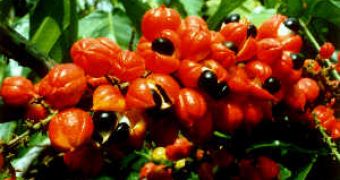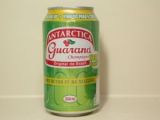When you will visit Brazil, they may invite to have a guarana.
Despite the strange name, they are not talking about an exotic amphibian, but about a refreshing drink.
If coffee and tea are the most popular drinks around the world, in Brazil their place is taken by guarana.
In fact, they have something in common: caffeine. In fact, the same guarana volume contains three times more caffeine than coffee. Guarana has a fizzy, fruit flavor.
The plant is a vine from the Amazon Basin, now being also cultivated in other areas of Brazil. The plant reaches 10 m (30 feet) tall and in the third year, and in January or February, it starts producing fruits. A five years old plant can produce about three fruit kilograms.
Guarana fruits are the size of a grape berry and carry one or two smooth oval seeds. The top of the fruit is light red while the base is yellow. The fruits are soaked, and the seeds washed, dried, roasted and ground till they turn in powder.
Later, the caffeine containing powder is mixed with water, and - sometimes - cacao and manioc. Local indigenous people used guarana long before Brazil's colonization by the Portuguese people. To get a high quality beverage, the Indians collected only ripe fruits, discarding those unripe or overripe. The seeds were crushed and mixed with water, resulting in a thick paste. From this paste, they made sticks 15 cm (6 inches) long and 2.5 cm (one inch) thick.
The sticks were dried till they hardened enough, this being a primitive method of keeping food in zones with warm and wet climate. Dried sticks were grated, usually against the palatine bone of a giant fish (pirarucu: Arapaima gigas).
The powder was added to water and fruit juice. The Indians regarded the beverage as therapeutic: the shamen used to prescribe it to the diseased. The beverage was also used as a remedy against exhaustion. When guarana reached Europe at the beginning of the XIXth century, it was neglected as the therapists replaced it with cheaper products.
Guarana has been proven not only as tonic, but a heart sedative and quite efficient in fighting agains arteriosclerosis and vein thickening, dysentery and headaches.

 14 DAY TRIAL //
14 DAY TRIAL // 
